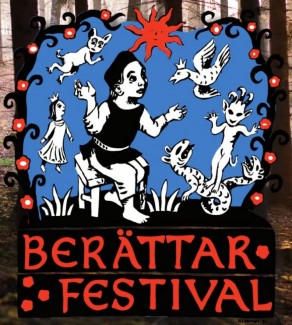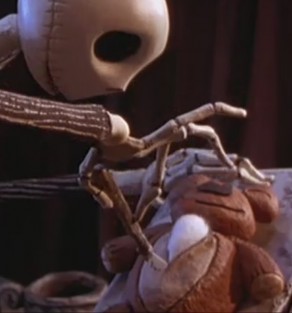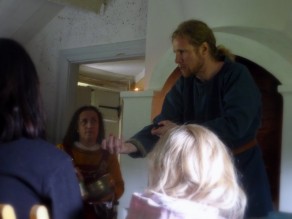I’ve indulged my love for the oral traditions at the twenty-second storytelling festival in Ljungby. During four and a half days, I listened to stories with only a few breaks to sleep and eat. It was an orgy of oratory opulence that would make Caligula blush. My mind filled to the brim with fantastical fables. I fear the faerie kind charmed my ears and made them dance with tall tales until they were nothing but red stumps. All thanks to the art of storytelling.
What is storytelling?
We all enjoy a good story. We read books, listen to the radio and watch films. Sadly, few people today listen to professional storytellers. It wasn’t long ago that storytelling was commonplace, but it has almost vanished in the modern world. Why is that? Perhaps the answer lies in the fact that storytelling is something that can never be scaled up and mass-produced, thus Big Corp with their advertising budget will never embraced it. They favour easily sold stories such as those on TV. But does the decline of storytelling matter? Does traditional storytelling offer anything that modern-day media does not?
Imagine you’ve paid a lot of money to go and see your favourite band play. When you arrive, you find that both the band and the audience are missing. Replacing the band is a big screen projection of their music videos. The top-of-the-range sound system sounds great, and the light show is amazing, but do you leave the concert happy? I imagine not. No amount of special effects can replace the all-important human connection to both the band and the rest of the audience. You want the immediacy of their being in the same room as you.
That human connection is why storytelling, despite its modest special effects, is better at captivating an audience than films or books. A professional storyteller exploits that our brains are wired to communicate with other humans standing directly in front of us. Storytellers use not just words but also tone of voice, facial expressions, eye contact, body language and many other tricks to draw you out of yourself and into the story.
Our brains are wired with mirror neurons, the cause of our empathy. In short, they are the reason we feel, to varying degrees, what others feel as if we experienced it ourselves. Mirror neurons are why we flinch when somebody else gets hurt or smile when we see someone else smile. Like a puppeteer of the heart, the storyteller pulls at our mirror neurons through his own mimesis, bypassing all rational layers of the mind and directly manipulates our emotions.
Another reason why storytelling can be so captivating is that the storyteller, like the author, enlists the services of our brains to fill in any sensory gaps. The storyteller may talk of a dark and eerie alleyway, and our brains dutifully create our ideal version of a dark and eerie alleyway, custom-made to creep us out. Your brain knows best what makes it tick, so you are bound to be spellbound by whatever it creates. For those of you with children, this also means that storytelling has a built-in safety net. Children can only create the mental images that they can handle, as opposed to the TV that may serve up any amount of horror for which the child may not be ready.
While on the topic of children, let’s dispel on old misconception. Storytelling is not just for kids. Yes, there are child-friendly stories of kingdoms far far away, but there are also stories with – sometimes distressingly – adult themes. So don’t disregard storytelling as a childish thing that you have outgrown.
In the end, picking apart storytelling to explaining its magic is as futile as dissecting teddy bears to explain why they comfort children. Storytelling must be experience first hand. I hope that I have inspired you to explore it further. Being a niche hobby, it can be difficult to find. If you are in a big city then you should be able to find a storytelling club or café near you. If you live in a smaller community then look for a national storytelling club and see if they organize something close to you. And of course, if you are lucky to live near Sweden, you should seek out the next Ljungby Storytelling Festival!
Ljungby Storytelling Festival
Ljungby is a small town in the middle of a big dark forest, a forest that is fertile ground for old folk tales. The area is riddled with these old legends, and perhaps it is because of these stories that, despite Ljungby’s modest size, there is a large annual storytelling festival here.
The festival is as simple as it is brilliant. Storytellers from around the world (mostly Sweden) come to tell stories. It is a packed programme with several performances happening at any given time, spread out over different houses in the old part of town. The festival ground is small so you can quickly run from one performance to the next.
In years past, some of the stories were told outside Ljungby in remote forest clearings and cliffs. Those would be the ghost stories. However, this year that never happened.
The festival is very basic in that it does little more than pull in and organize great storytellers. This is a great thing as the festival never ‘gets in the way’ of the stories. There are usually 4-5 English speaking storytellers so foreign visitors can enjoy some stories, but Swedes get a wider choice of course.
I love this festival. Some think that I am a little obsessed, and they are correct. Perhaps this is best illustrated through some statistics.
- Days: 4.5
- Total time listening to stories: 28.5 hours
- Record day: 8,5 hours of stories, from 10am to midnight
- Storytellers seen: 32
- Normal performances: 21 performed by 16 different storytellers
- Small performances during 5 compendium events: 40 performed by 26 different storytellers
And it was totally worth it.





If someone want to start listen to storytellers but don´t want to wait untill the next festival you can use this site (that is if you live in sweden) http://www.berattarnatet.se/
And yeeeey, Jack Skellington <3
Thank you for a great outside view and brilliant explanation of storytelling!
And thanks to our favorite audience member this festival. It was great to tell to such listening ears.
/one of the storytellers.
Reading your text I kep thinking, this guy really gets story telling.
But then, with that listening record – you really should 😉
As Love says, It was really nice to have you in the audience, and I hope to meet you and your eyes and ears somewhere in the future again.
/an other of the storytellers
You claim that “Sadly, few people today listen to professional storytellers.”. Isn’t that what we do every time we go to the movie or read a novel? It’s not storytelling by talking (in the same room), but it’s still storytelling, and in fact a movie can add another dimension that would be necessarily missing from the traditional environment in which stories were told. So I’m not sure that you can really argue that the art of storytelling is declining. It is being transformed, yes, and stories are told through different means, but it is still powerful – more powerful than traditional storytelling in some ways, and less powerful in others.
Hey Tobias! As a toastmaster though, surely you know the power of face to face communication. I think this is what Gustav refers to mirror neurons (the concept being empathy…like a yawner gets others to yawn too). It demands more of the spontaneity of the speaker as well as the listener. They have to act and be creative all at once. The story can diverge any time they want as they read the audience. So yes, as your last statement, there are pluses and minuses to storytelling. Just as long as it doesn’t become a lost art!
I agree that films, books, radio etc are all telling stories, but I meant a different meaning with storytelling, i.e. the oral tradition of direct person-to-person telling of stories with words and body language.
All mediums have their strengths and weaknesses. I think storytelling have some wonderful strengths that few people know about because few people go to listen to professional storytellers. If more people did then I am sure that this way of telling stories would be more wide-spread and appreciated.
Stories will never decline. We need them far too much for that. But I hope that we will guard the many mediums for stories that we have. The oral traditions are in danger of waning away, so we should take special care with them.
My friend Laura says there is a storytelling podcast called “The Moth”, downloadable from the iTunes store. For specifically American storys check out the podcasts “This American Life” or “Fresh Air”. Not specifically storytelling, but compelling none the less: “WNYC Radiolab” (creative science) and “Stuff You Should Know” (from how stuff works). I’m checking out “The Moth”!
Anyone interested interested in storytelling could do well to google “memory palace”. I learned of this interesting technique by reading Joshua Foer’s “Sleepwalking with Einstein”. Before the printing press, people memorized long stories as the only way to entertain themselves, pass on information and family history. They knew of many more mnemonic devices than we googlers do today. The concept of the memory palace was commonplace knowledge back then, just as they knew more about the sky.
[…] Lyssnaren är lika viktig för en berättarfestival som berättaren. Jag vågar nog utnämna Gustaf till festivalens flitigaste besökare. I flera år har han kommit till Ljungby under festivaltiden. I en egen blogg hyllar han både det muntliga berättandet i allmänhet och Ljungby berättarfestival i synnerhet. Det är insiktsfullt skrivet. Missa inte hans tankar utan gå till Gustafs blogg https://www.themodernnomad.com. […]
You definitely are a great story teller.
[…] Här kan du läsa hans reflexioner kring 2011 års festival. Postat i Nyhet […]
My favorite storyteller locally in New York is a great guy named Adirondack Bill Smith. He weaves tall tales about life in the Northern New York and Canadian logging camps, as well as singing folk songs and reading traditional poetry. His voice is like a pleasant grandfather and he always sounds like he’s smiling.
That reminds me that there is a podcast called ‘A Prairie Home Companion’s News From Lake Wobegong’, which is an excellent piece of remote storytelling. Tall tales delivered in a complete deadpan way. The pace is slow, the buildup genuin and the jokes utterly strange. Not for everyone but worth a look!
also, I thouroughly enjoy and strongly recommend the NPR show “Snap Judgement” which carries the tagline “Storytelling with a beat”.
The Prarie Home companion is a favorite of mine. I even own the movie, Garrison Keillor’s voice is like a warm soothing bath! I love seeing the show live. It travels the country and is also a show on NPR.